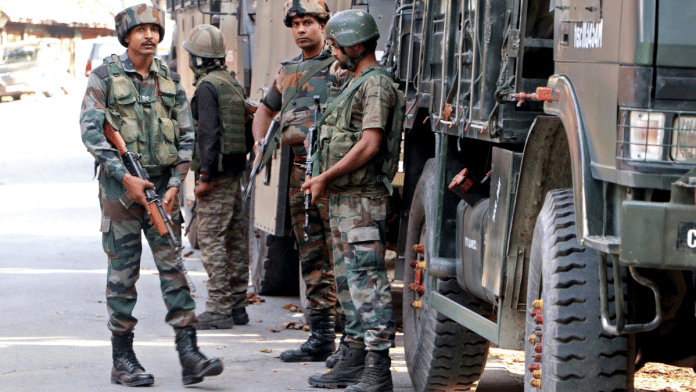The Pir Panjal Range, part of the Lesser Himalayas, running roughly in a northwest to southeast alignment, serves as a geographical and cultural barrier between the Kashmir Valley to the north and the plains of Jammu to the south. In recent years, there has been a concerning increase of terrorist activity in the regions south of the range. This barrier between a Hindu-majority Jammu region and Muslim-majority Kashmir Valley was always considered as the first line of defence against terrorism by the politico-military establishment. This shift in terror–related incidents to the south of the Pir Panjal Range, therefore, poses serious challenges to regional stability, national security, and the socio-economic development in the hinterland of the affected areas.
The resurgence of terrorist-initiated incidents in the Union Territory following the successful conduct of Assembly elections and the swearing–in of a democratically elected government is equally a cause for concern. By carrying out attacks in relatively calmer areas like Sonamarg, the intent is not only to negate the notion of normalcy but also to demonstrate the reach of these terror groups, thereby necessitating a readjustment of the counter-insurgency counter-terrorism (CICT) grid. Such a readjustment aligns with changing threat perceptions and ground realities, as security forces cannot be deployed in strength everywhere at all times, and should not be seen as merely reactive.
The renewed terrorist activity south of the Pir Panjal Range has manifested in various forms, including cross-border infiltration, recruitment drives, and localised attacks. Terrorist groups operating in this region have linkages to larger organised networks that exploit perceived grievances. The rise in violence is marked by the increased attacks on security personnel, targeted killings, and assaults on civilian populations. These incidents have stoked fears among the local populace, leading to a cycle of mistrust and further violence. One of the reasons behind the increase in militant attacks is the nexus between drug traffickers and terrorist organisations—narco-terrorism—which knows no moral, cultural, or religious boundaries. High unemployment rates, particularly among the youth, along with a lack of development and a prevailing sense of deprivation, create fertile ground for recruitment by terror groups. Many young individuals, disillusioned by limited opportunities, are lured by these organisations that promise a sense of purpose and belonging, along with easy money.
Also read: Jammu insurgency can be fixed by the Army. The real solution is political
A proxy warfare
Jammu has seen 33 terrorist-related attacks since 2021, according to official data. This year, 11 soldiers have been killed and 18 injured in eight attacks, while 12 civilians died in the first six months—same as the whole of 2023. In the first 15 days since the J&K Assembly elections, there have been as many as 15 deaths all over the Union Territory, many of them labourers, and a local doctor. Another major tragedy was averted in Jammu in June when an alert villager raised an alarm about the presence of some armed persons, leading to the subsequent elimination of the terrorists. Such inputs underscore that not just the security forces but all sections of society must remain vigilant to ensure a peaceful environment. This increase in terrorist activity has resulted in the deployment of certain additional forces in the Jammu region from their peace-time locations, to tide over the immediate requirement of establishing normalcy.
Despite ongoing military efforts, cross-border infiltration and support for militants remain critical issues. The porous borders and the presence of militant training camps across the Line of Control (LOC) enable armed groups to enter Indian territory, sustaining terrorist activities. It is a known fact that terrorist or insurgent activities cannot survive without external support, both moral and material. Although Pakistan may claim to provide only moral support, there is irrefutable evidence to the contrary, including terrorist training camps, infrastructure, and Pakistani citizens—often criminals released from jail—among the terrorists killed in various operations in India. Terrorist groups based in Pakistan, particularly those linked to organisations like Lashkar-e-Taiba and Jaish-e-Mohammed, have historically infiltrated the Jammu region. Terrorism in Jammu can also be seen as a form of proxy warfare, where external actors use local militants to achieve geopolitical goals while maintaining a degree of deniability. This includes creating unrest in India while simultaneously diverting attention from more pressing domestic issues within Pakistan.
A study has shown that the number of security forces personnel required for successful counter-insurgency operations ranges from 20 to 25 per 1,000 civilian population for law-enforcement tasks, and from 100 to 150 personnel per 1,000 civilian population in low–intensity conflict scenarios. Given that the population of Jammu and Kashmir is around 1.25 crore, a simple back-of-the envelope calculation will show that this kind of deployment is neither possible nor desirable or practical. Hence, a dynamic CICT grid, which has served us well, is required to achieve the essential concentration of forces where required.
Given the presence of security forces required, it is high time that we expand the scope of our CICT operations to take out potential targets within our neighbouring countries that pose a direct threat to our security and sovereignty. The US’ global war on terror that targeted threats in Afghanistan after the 9/11 attacks or Israel’s retaliatory operations in Gaza against Hamas after the 7 October 2023 attacks, now expanded to Lebanon, Syria, and even Iran, need no elaboration. Taking a cue from these and similar such unilateral actions taken by various countries, without the United Nations’ approval, in pursuance of their national security interests, India must similarly chart its own course of action. Those sponsoring terrorism or proxy war, whether state or non-state actors, must be made to pay a price.
General Manoj Mukund Naravane PVSM AVSM SM VSM is a retired Indian Army General who served as the 28th Chief of the Army Staff. Views are personal.
(Edited by Aamaan Alam Khan)






